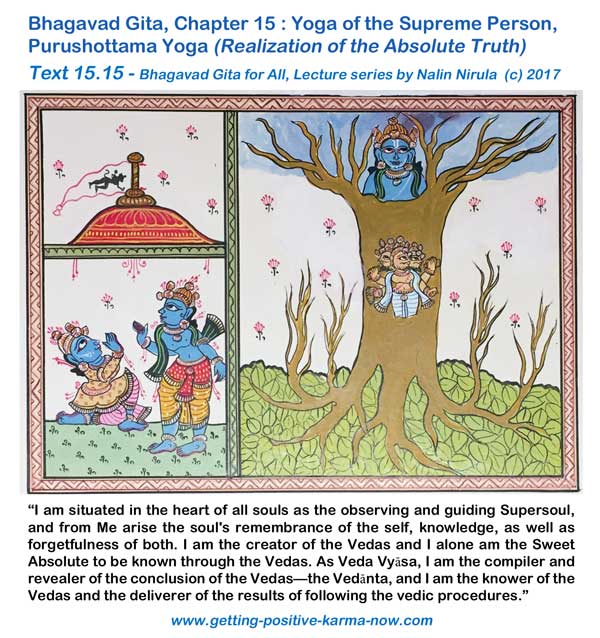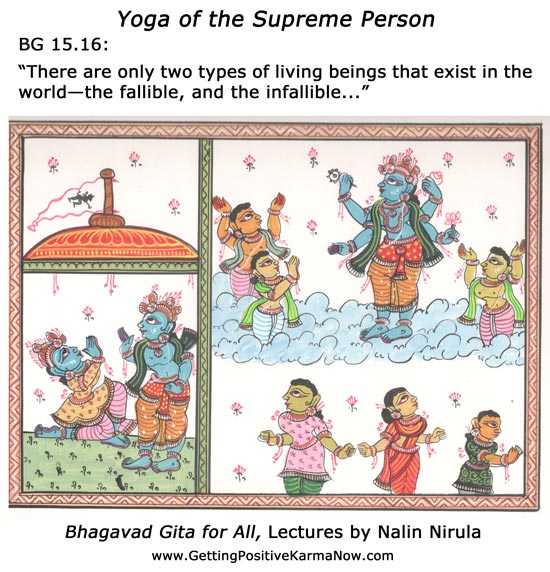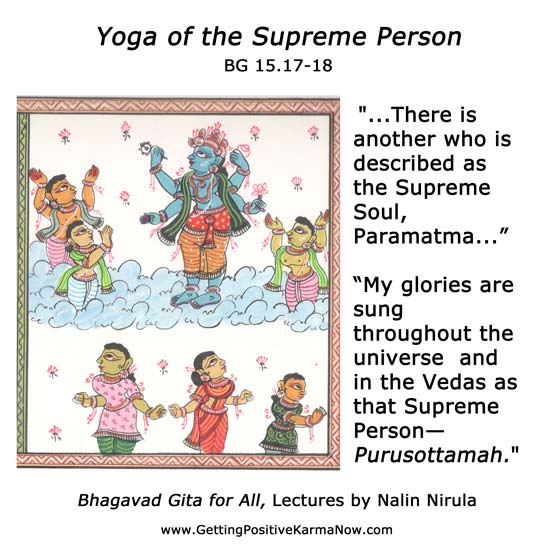



Bhagavad Gita 15.1
śrī-bhagavān uvāca
ūrdhva-mūlam adhaḥ-śākham
aśvatthaṁ prāhur avyayam
chandāṁsi yasya parṇāni
yas taṁ veda sa veda-vit
Synonyms
śrī-bhagavān uvāca — the Supreme Lord said; ūrdhva-mūlam —
upward rising roots (in aversion to the Supreme Lord); adhaḥ — downwards
facing; śākham — branches (representing the beings in the material world
from Lord Brahma to those in the lowest species) ; aśvattham — a banyan
tree that is transient (for those in devotion to the Supreme Lord Kṛṣṇa);
prāhuḥ — is said in the scriptures (in describing the material world);
avyayam — eternal; chandāṁsi — the Vedic hymns (specially the
Chandayoga Upanisad); yasya — of which banyan tree; parṇāni — the
nourishing leaves; yaḥ — anyone who; tam — that; veda — knows; saḥ —
he; veda-vit — the knower of the Vedas.
Bhagavad Gita 15.2
adhaś cordhvaṁ prasṛtās tasya śākhā
guṇa-pravṛddhā viṣaya-pravālāḥ
adhaś ca mūlāny anusantatāni
karmānubandhīni manuṣya-loke
Synonyms
adhaḥ — downward; ca — and; ūrdhvam — upward (to the plane of
celestial beings); prasṛtāḥ — extended; tasya śākhāḥ — Its branches,
representing the living beings; guṇa — by the three modes of material nature;
pravṛddhāḥ — nourished; viṣaya — sense objects; pravālāḥ — twigs (with
its shoots, representing the objects of the senses); adhaḥ — extending downward
(to the planes of human, animal, and lower beings); ca — and; mūlāni —
roots; anusantatāni — have extended (as a secondary causal factor, as the search
to enjoy the fruits of actions); karma — to work; anubandhīni — bound
(karma anubandhīni –According to religious and irreligious actions) ; manuṣyaloke — in the world of human society in the plane of karma and karmic
consequences.
Bhagavad Gita 15.3-4
na rūpam asyeha tathopalabhyate
nānto na cādir na ca sampratiṣṭhā
aśvattham enaṁ su-virūḍha-mūlam
asaṅga-śastreṇa dṛḍhena chittvā
tataḥ padaṁ tat parimārgitavyaṁ
yasmin gatā na nivartanti bhūyaḥ
tam eva cādyaṁ puruṣaṁ prapadye
yataḥ pravṛttiḥ prasṛtā purāṇī
Synonyms
na — not; rūpam — the inverted form; asya — of this tree; iha — within this world; tathā — also; upalabhyate — that which is realized; na — never (without vedic knowledge); antaḥ — end; na — nor; ca — also; ādiḥ — its origins; na — never; ca — also; sampratiṣṭhā — the foundation; aśvattham — banyan tree; enam — this; su-virūḍha — strongly; mūlam — rooted; asaṅga-śastreṇa — getting the weapon of detachment form association with devotees- sadhu sanga; dṛḍhena — strong; chittvā —cutting; tataḥ —thereafter; padam — that place, (the lotus feet of the Lord); tat — that; parimārgitavyam — the way to which has to be searched out; yasmin — where; gatāḥ — going; na — never; nivartanti — they come back; bhūyaḥ — again; tam — to Him; eva — certainly; ca — also; ādyam — original; puruṣam — the Personality of Godhead; prapadye — surrender, take shelter of; yataḥ — from whom; pravṛttiḥ — the beginning; prasṛtā — extended; purāṇi — very old.
Bhagavad Gita 15.5
nirmāna-mohā jita-saṅga-doṣā
adhyātma-nityā vinivṛtta-kāmāḥ
dvandvair vimuktāḥ sukha-duḥkha-saṁjñair
gacchanty amūḍhāḥ padam avyayaṁ tat
Synonyms
nir — without; māna — false prestige; mohāḥ — and delusion (false belief) – [Having become free from pride and delusion]; jita — having conquered, becoming free; saṅga — of association, attachment; doṣāḥ — the faults; adhyātma —spiritual knowledge of the self, self-realization; nityāḥ — (dedicated to/engrossed in the) eternal; vinivṛtta — disassociated; kāmāḥ — from lust; dvandvaiḥ — from the dualities; vimuktāḥ — liberated; sukhaduḥkha — happiness and distress; saṁjñaiḥ — named; gacchanti — attain; amūḍhāḥ — un-bewildered; padam — position, shelter ; avyayam — eternal; tat — that.
Bhagavad Gita 15.6
na tad bhāsayate sūryo
na śaśāṅko na pāvakaḥ
yad gatvā na nivartante
tad dhāma paramaṁ mama
Synonyms
na — not; tat — that; bhāsayate — illuminates; sūryaḥ — the sun; na — nor; śaśāṅkaḥ — the moon; na — nor; pāvakaḥ — fire, electricity; yat — where; gatvā — going; na — never; nivartante — they come back; tat dhāma — that abode; paramam — supreme; mama — My.
Bhagavad Gita 15.7
mamaivāṁśo jīva-loke
jīva-bhūtaḥ sanātanaḥ
manaḥ-ṣaṣṭhānīndriyāṇi
prakṛti-sthāni karṣati
Synonyms
mama — My; eva — certainly; aṁśaḥ — fragmental particle; jīvaloke — in the world of conditional life; jīva-bhūtaḥ — the conditioned living entity; sanātanaḥ — eternal; manaḥ — with the mind; ṣaṣṭhāni — the six; indriyāṇi — senses; prakṛti — in material nature (the separated inferior and separated superior); sthāni — situated; karṣati — attract, adopts, struggles.
Bhagavad Gita 15.8
śarīraṁ yad avāpnoti
yac cāpy utkrāmatīśvaraḥ
gṛhītvaitāni saṁyāti
vāyur gandhān ivāśayāt
Synonyms
śarīram — the body; yat — as; avāpnoti — gets; yat — as; ca api — also; utkrāmati — gives up; īśvaraḥ — the lord of the body; gṛhītvā — taking; etāni — all these; saṁyāti — goes away; vāyuḥ — the air; gandhān — smells; iva — like; āśayāt — from their source.
Bhagavad Gita 15.9
śrotraṁ cakṣuḥ sparśanaṁ ca
rasanaṁ ghrāṇam eva ca
adhiṣṭhāya manaś cāyaṁ
viṣayān upasevate
Synonyms
śrotram — ears; cakṣuḥ — eyes; sparśanam — touch (via the skin); ca — also; rasanam — tongue; ghrāṇam — smelling power; eva — also; ca — and; adhiṣṭhāya — presiding over; manaḥ — mind; ca — also; ayam — the living entity; viṣayān — sense objects; upasevate — enjoys.
Bhagavad Gita 15.10
utkrāmantaṁ sthitaṁ vāpi
bhuñjānaṁ vā guṇānvitam
vimūḍhā nānupaśyanti
paśyanti jñāna-cakṣuṣaḥ
Synonyms
utkrāmantam — departing the body; sthitam — situated in the body; vā api — either bhuñjānam — enjoying; vā — or guṇa-anvitam —(senses and their objects) under influence of the material modes of nature ; vimūḍhāḥ — deluded and foolish persons; na anupaśyanti — can not see; paśyanti — can see; jñāna-cakṣuṣaḥ — those who have the eyes of spiritual intelligence.
Bhagavad Gita 15.11
yatanto yoginaś cainaṁ,
paśyanty ātmany avasthitam
yatanto ’py akṛtātmāno,
nainaṁ paśyanty acetasaḥ
Synonyms
yatantaḥ — sincere, persevering; yoginaḥ — seeking transcendentalists; ca — also; enam — this; paśyanti — can see; ātmani — in the self; avasthitam — situated; yatantaḥ api — although making efforts; akṛta-ātmānaḥ — those without controlled senses and without self-realization; na — do not; enam — this; paśyanti — see; acetasaḥ — having undeveloped minds.
Bhagavad Gita 15.12
yad āditya-gataṁ tejo,
jagad bhāsayate ’khilam
yac candramasi yac cāgnau
tat tejo viddhi māmakam
Synonyms
yat — that which; āditya-gatam — in the sunshine; tejaḥ —effulgent splendor; jagat — the whole world; bhāsayate — illuminates; akhilam — entirely; yat candramasi — that (light) which is in the moon; yat — that which; ca —is also; agnau — in fire; tat — that; tejaḥ — brilliant heat and splendor; viddhi — understand; māmakam — from Me.
Bhagavad Gita 15.13
gām āviśya ca bhūtāni,
dhārayāmy aham ojasā
puṣṇāmi cauṣadhīḥ sarvāḥ,
somo bhūtvā rasātmakaḥ
Synonyms
gām — the planets; āviśya — entering; ca — also; bhūtāni — the living entities; dhārayāmi — maintain and sustain ; aham — I; ojasā — by My potency; puṣṇāmi — am nourishing; ca — and; auṣadhīḥ — plants, herbs and vegetables; sarvāḥ — all; somaḥ — the moon’s life-giving rays; bhūtvā — becoming; rasa-ātmakaḥ — essential juice.
Bhagavad Gita 15.14
ahaṁ vaiśvānaro bhūtvā,
prāṇināṁ deham āśritaḥ
prāṇāpāna-samāyuktaḥ,
pacāmy annaṁ catur-vidham
Synonyms
aham — I; vaiśvānaraḥ —the fire of digestion; bhūtvā — becoming; prāṇinām — of all living entities; deham — in the bodies; āśritaḥ — situated; prāṇa — the outgoing air; apāna — the down-going air; samāyuktaḥ — keeping in balance; pacāmi — I digest; annam — foodstuff; catuḥ-vidham — the four kinds (chewed, sucked, licked or drunk).

Bhagavad Gita 15.15
sarvasya cāhaṁ hṛdi sanniviṣṭo
mattaḥ smṛtir jñānam apohanaṁ ca
vedaiś ca sarvair aham eva vedyo
vedānta-kṛd veda-vid eva cāham
Synonyms
sarvasya — of all living beings; ca aham — and I; hṛdi — in the heart; sanniviṣṭaḥ — situated; mattaḥ — from Me; smṛtiḥ — remembrance of the self; jñānam — knowledge; apohanam — that drives away both (forgetfulness); ca — and; vedaiḥ — by the Vedas; ca — also; sarvaiḥ — all; aham — I am; eva — alone; vedyaḥ — the knowable Absolute object; vedānta-krt — the creator, compiler of the Vedas and the deliverer of the fruits of vedic sacrifices = Vedānta; veda-vit — the knower of the Vedas; eva — certainly; ca — and; aham — I.

“There are only two types of living beings that exist in the world—the fallible, and the infallible. All the living beings from Lord Brahma to the lowest entity are perishable due to having fallen away from their true nature and having come in contact with material nature. Those who are situated in their eternally perfect nature in oneness of eternal association with the Supreme Lord, are known as infallible.”
Bhagavad Gita 15.16
Synonyms
dvau — two; imau (eva)— (only) of these [imau dvau eva]; puruṣau — living entities; loke — in the world; kṣaraḥ — changeable, perishable, fallible; ca — and; akṣaraḥ — immutable, infallible; eva — certainly; ca — and; kṣaraḥ —perishable, fallible; sarvāṇi — all; bhūtāni — living entities; kūṭa-sthaḥ — spiritually situated in oneness; akṣaraḥ — infallible; ucyate — are described.

Bhagavad Gita 15.17
Synonyms
uttamaḥ — the supreme, highest, best; puruṣaḥ — person, personality; tu — but; anyaḥ — another; parama-ātmā — the Supreme Soul; iti — thus; udāhṛtaḥ — is described; yaḥ — who; loka trayam—the three divisions of the world (universe); āviśya — enters; bibharti — maintains, sustains; avyayaḥ — eternal; īśvaraḥ — the Lord.
Bhagavad Gita 15.18
yasmāt kṣaram atīto ’ham
akṣarād api cottamaḥ
ato ’smi loke vede ca
prathitaḥ puruṣottamaḥ
Synonyms
yasmāt — because; kṣaram —to the perishable beings; atītaḥ — transcendental; aham — I am; akṣarāt — the imperishable beings; api — also; ca — and; uttamaḥ — superior; ataḥ — therefore; asmi — I am; loke — in the world; vede — in the Vedic literature; ca — and; prathitaḥ — celebrated; puruṣa-uttamaḥ — as the Supreme Person.

Bhagavad Gita 15.19
yo mām evam asammūḍho
jānāti puruṣottamam
sa sarva-vid bhajati māṁ
sarva-bhāvena bhārata
Synonyms
yaḥ — anyone who; mām — Me; evam — only, thus; asammūḍhaḥ — without a doubt; jānāti — knows; puruṣa-uttamam — the Supreme Personality of Godhead; saḥ — he; sarva-vit — the knower of everything; bhajati — renders devotional service; mām — unto Me; sarva-bhāvena — in all moods; bhārata — O son of Bharata.
Bhagavad Gita 15.20
iti guhya-tamaṁ śāstram
idam uktaṁ mayānagha
etad buddhvā buddhimān syāt
kṛta-kṛtyaś ca bhārata
Synonyms
iti — thus; guhya-tamam — the most confidential; śāstram — revealed scripture; idam — this; uktam — disclosed; mayā — by Me; anagha — O sinless one; etat — this; buddhvā — understanding; buddhi-mān — intelligent; syāt — one becomes; kṛta-kṛtyaḥ — the most perfect in his endeavors; ca — and; bhārata — O son of Bharata.